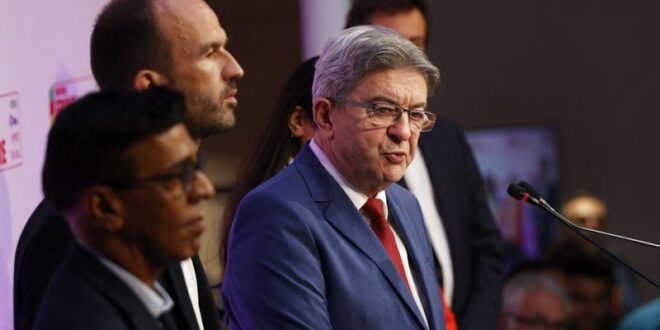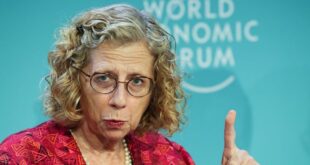PARIS (Reuters) – French political leaders from the left-wing bloc that came first in Sunday’s legislative election said they intended to govern according to their high-spending programme, but centrists said they should play a role as the left lacked a majority.
The unexpected outcome of the snap election has plunged France into uncertainty just before the Paris Olympics, with no obvious path to a stable government capable of getting any legislation passed by a fragmented parliament.
The left-wing New Popular Front (NFP) won the most seats in the National Assembly but fell short of an absolute majority by about 100 seats. President Emmanuel Macron’s centrists came second and the far-right National Rally third.
NFP leaders have met behind closed doors several times since the shock result came out on Sunday night, attempting to thrash out an agreement on which of them should be prime minister and how they should approach governing without a majority.
Jean-Luc Melenchon, leader of the hard-left France Unbowed, said an NFP government should fully implement its programme, which includes raising the minimum wage, lowering the retirement age and capping the prices of fuel, power and some food staples.
The policy programme “cannot be sliced into pieces”, he said on TF1 television late on Monday, rejecting the idea of a coalition with parties from outside the NFP.
“This country is suffering from the lies of its leaders who promise certain things and deliver others,” said Melenchon, arguing that this was a reason why the NFP should stay true to its stated principles.
However, centrists pointed out that the NFP was too far short of a majority to govern without support from their own parliamentary bloc. They implied that the NFP should break up so that its more moderate elements could form a broader coalition of centre-left, ecologist, centrist and centre-right parties.
“The centrist bloc is prepared to negotiate with all parties that share our republican values,” said Foreign Minister Stephane Sejourne, the leader of Macron’s Renaissance party, speaking on LCI television.
“Our pre-conditions need to be worked out, but our red lines are well-known,” he said, listing support for the EU and for Ukraine, fighting racism and antisemitism, accelerating the transition to a green economy and maintaining efforts to boost France’s attraction as an investment destination.
“That necessarily excludes Jean-Luc Melenchon and France Unbowed from the government equation,” he said.
NOT BUSINESS AS USUAL
But Olivier Faure, leader of the Socialist Party which won the second largest number of seats within the NFP alliance, just behind France Unbowed, rejected the centrist overtures and the idea of breaking up the NFP.
“The voters have rejected the outgoing government three times, in the European elections and in both rounds of the legislative election. The French people have made it clear they do not want more of the policies that have been pursued for seven years,” he said on LCI, referring to Macron’s time as president.
In the absence of clarity on when a new government could be formed, Macron asked Prime Minister Gabriel Attal on Monday to stay on for the time being, to provide stability for the country.
Within the NFP camp, there appeared to be no consensus on who should replace Attal.
Melenchon and his France Unbowed allies were all saying it should be someone from their party, on the basis that it won the most seats out of all the members of the NFP alliance.
Asked on TF1 whether he wanted the job, Melenchon did not rule himself out but said it did not have to be him.
“I’m part of the solution, not the problem … We’ll talk about it amongst ourselves. We at France Unbowed have several candidates to put forward,” he said, naming his close allies Manuel Bompard, Mathilde Panot and Clemence Guette.
But other NFP leaders, from the Socialist and Green parties, have said Melenchon himself could not be prime minister because he is too divisive, and have not conceded that the head of government should definitely be someone from France Unbowed.
While none of them has clearly put themselves forward, several names have been circulating in French media.
The most frequently cited since the election have been Faure, Raphael Glucksmann, who led France’s left-wing ticket in the European elections, and Green leader Marine Tondelier.
(Writing by Estelle Shirbon; Editing by Keith Weir)
 BeritaKini.biz Berita Viral Terkini di Malaysia
BeritaKini.biz Berita Viral Terkini di Malaysia





